My Family
When Mt. Katmai blew up in Alaska in 1912, some of my family were living in Seldovia and some were living in Kodiak and Woody Island.
Before 1912, my grandmother, Hattie Bowen Johnson, and her children and her sister Elizabeth (Lizzy) and husband James Ward were in Seldovia. James was running a mail boat in 1906. The Seldovia census of 1910 shows Hattie with daughters Susie, Mary, and Florence.
When Mt. Katmai blew up, the boat Cutter Manning was in Kodiak and the family left on it. They said that the ashes from the volcano were so thick that they had to lay planks down to walk to the boat. Several children were smothered from the ash.
My family that came were my great grandmother, Barbara Bowen Rhodes, my great uncle Rufas Bowen, his wife Sally, and their children, my great aunt Florence Bowen Olssen, her husband Charlie, and their family, my great aunt Barbara Bowen Wick, and my great uncle Fred Bowen. Richard Olssen, Florence’s son, was born on the Cutter Manning on the way to Seldovia on 24 June 1912.
Rufas bought the property where the Morris store and house is. My grandfather Andy Johnson bought the property just above his. Later, Morris built a home on the same place my grandparents’ log house was.
The relatives not only had big gardens, but they all fished for food.
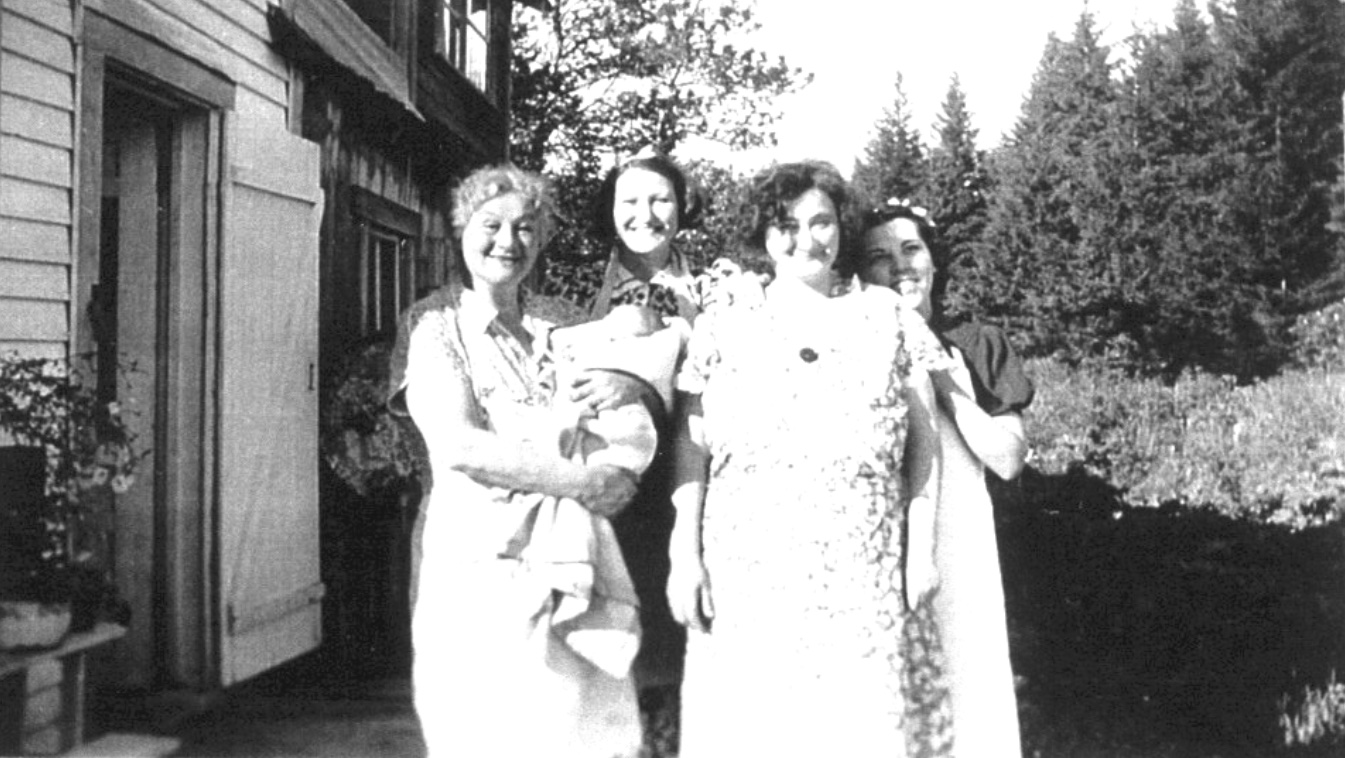
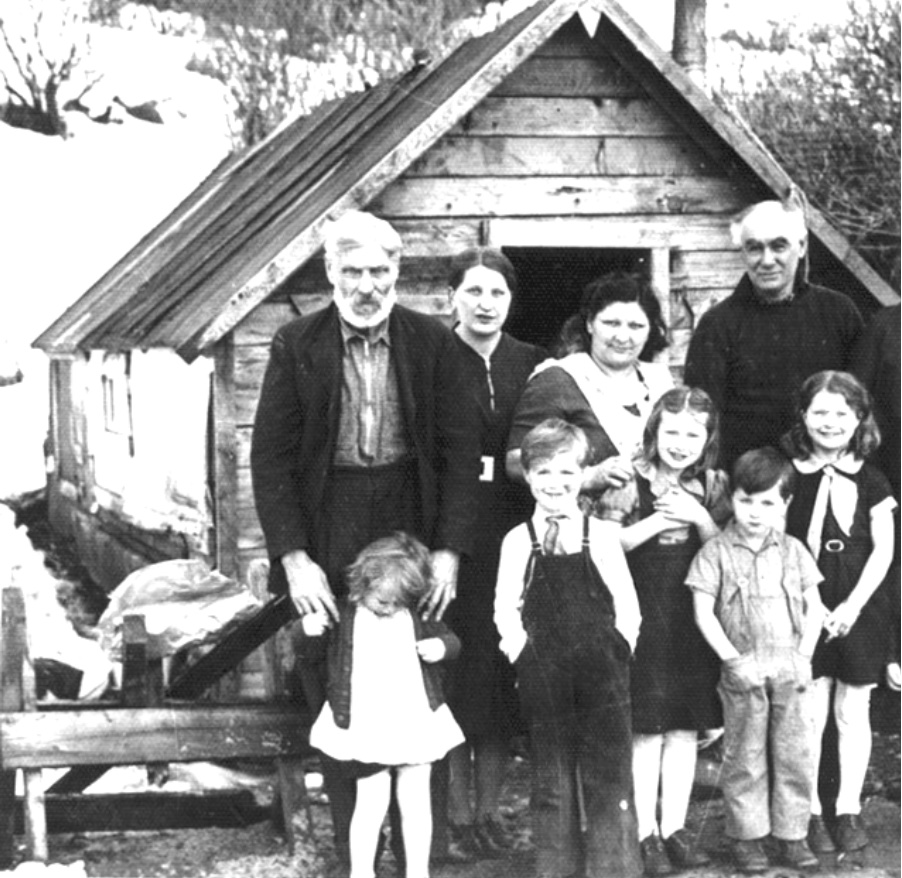
Papa. My grandfather Andrew Johnson was born 12 February 1864 in Finland. His father was Tog Mickelson of Sweden. We don’t know his mother’s name, but she was from Sweden. She may have taken an adopted name. We think that he came to the United States around 1892, coming through Ellis Island in New York. He went down the Yukon River on a raft with two men and it was said that both of the other men were robbed and killed. He worked in the mines in Wyoming and in a copper mine in Montana. He then went to Death Valley for gold, and then to Alaska for gold. He went to Kodiak on the Steamer Dora. One of the jobs he had was a net maker, and, while in Finland, he made wooden pegs for boats. He built a 30-foot boat named the Elsie. My brother Tom said that he found several brass knuckles in the attic when he was young.
Andy married Harriett Susanna Bowen in Kodiak, Alaska. She was born 24 September 1888. He was about twenty-four years older than she, but he outlived her by eleven years.
Andrew Johnson and Hattie had eight daughters, Susan B. born 22 April 1906, Mary born 2 February 1908, Florence born September 1910 in Kodiak, my mother Harriett Catherine (Hattie), and Elsie born in Seldovia. Five of the girls died young, one from a bee sting she got while burying bees in holes in the bank. Two died as infants and two died of the flu. The survivors were Susan B., my mother, and Elsie.
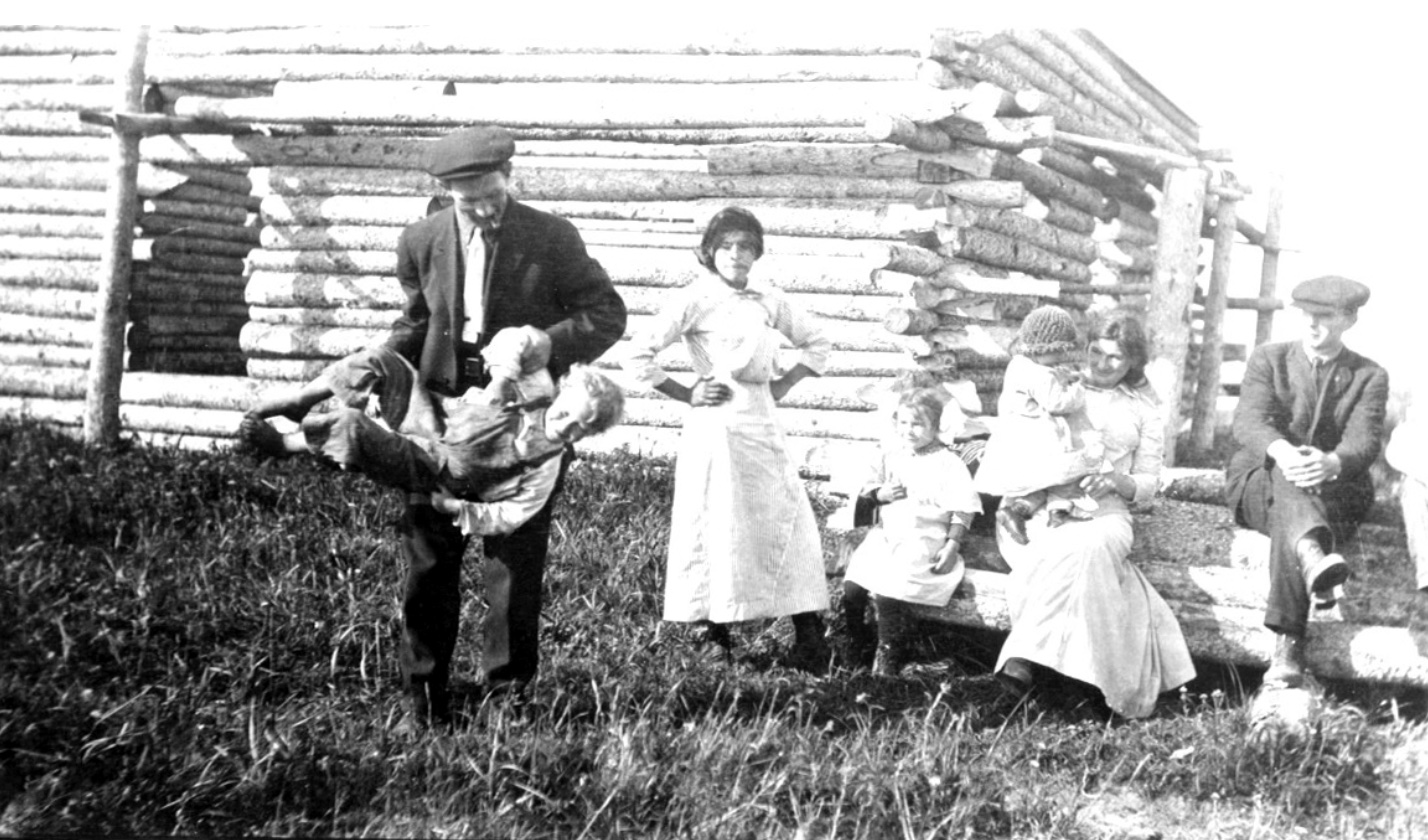

I remember my grandfather quite well. We all called him Papa and we were quite close to him. He carried my sister Dolly around all the time because she couldn’t see very well. At night he would sit by our big wood stove and whittle the kindling wood for the next day, then wind his big clock at exactly nine, and everyone was supposed to be in bed at that time. He walked in his sleep and Mom had to keep a wet towel by the outside door as he would go into the pantry and mix up all the barrels of peas, beans, and rice in his sleep. I don’t remember him working but he must have had gold money stashed away as they lived quite well during the depression.
Log House. My grandparents’ log house was just above the waterfront; later Morris’s store and house was in front. The house had one large living room, a large kitchen, a small bedroom, and a very large bedroom. Later they added a storeroom that kept the many barrels of dry goods, which included rice, beans, peas, and also barrels of pickles and wieners and butter in brine. They also built a large entrance room. Before the pantry we had the barrels of wieners and pickles in our bedroom. I remember trying the pickles and wieners, but they were so salty we couldn’t eat any of them.
My mother and her six children lived in this house until 1940 when he became too sick to have children around.
My brother built a big playhouse in the yard of our log house. He had a five-gallon gas can as the stove. I remember it being on fire and it burned down. I didn’t find out until we were grown up that he burned it down deliberately, because Louie, a friend of ours, and a girl named Alice were necking in it.
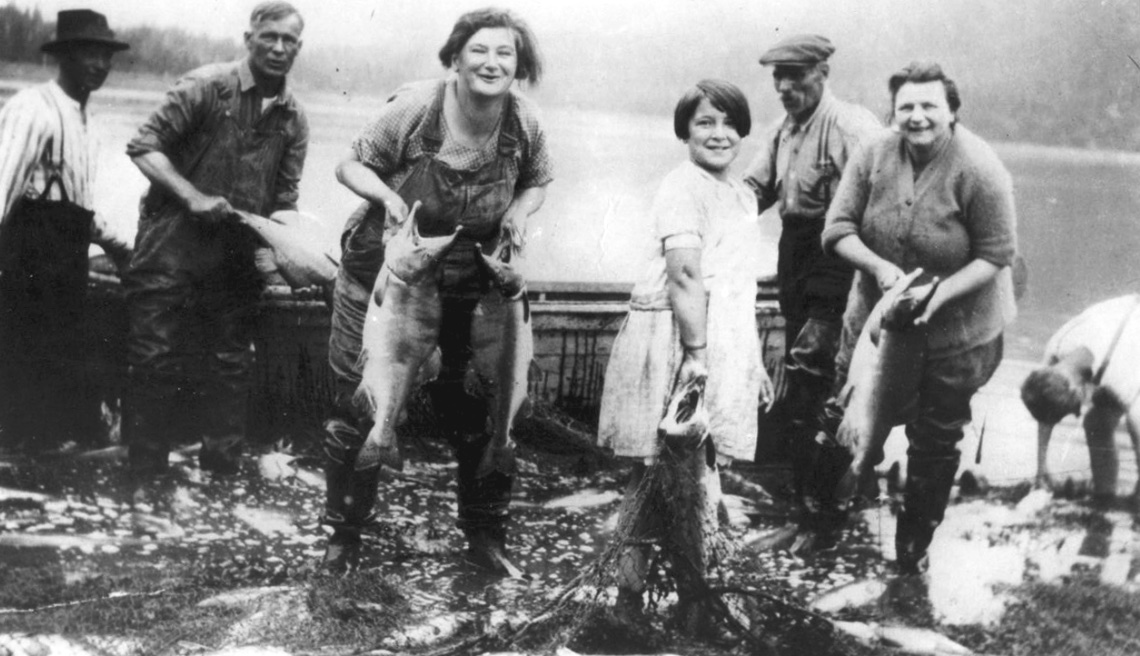
Mom said that when the bob hair cut came in, she was in her teens and her hair was almost to her feet. She went to Joe Hill’s and had her hair cut. Joe Hill tied a big red bow on it and hung it over his mirror in his barber shop above his bar. It burned up when his building burned. Her dad was furious and wouldn’t speak to her for a while, because she looked like a boy.
I was about nine years old when we moved. Papa died a short time later, and the Morris’s bought our property and built a house for themselves while their daughter and family lived in their old house. When he died, on 13 July 1940, I was taken into the room at the house where they had his coffin. During the next three days I couldn’t talk; I felt like I had a big lump in my throat. My mother wouldn’t let me go to another funeral until I grew up.
My grandfather had built other houses in Seldovia. He had his money working in the copper mines in Montana and also in the Gold Rush.
Matt Yuth built a two-story house above us. My grandfather Andy Johnson sold him some of our land. His children, Virginia, Louise, Helen, MayJoyce, Luba, George, Hartly, and Harry, were all good friends. Up the path from his house was the Gundersons house. Two of their girls would spend the night at our house sometimes, but the younger one always ended up crying to go home. I think she sunk too far into our big feather mattress and didn’t like that.
Irene Saracoff Poncheen and their four children lived in that house at one time. She was accidentally shot in the stomach while quite young. She had several brothers, Alex, Steve, Johnny, and Frankie I remember.
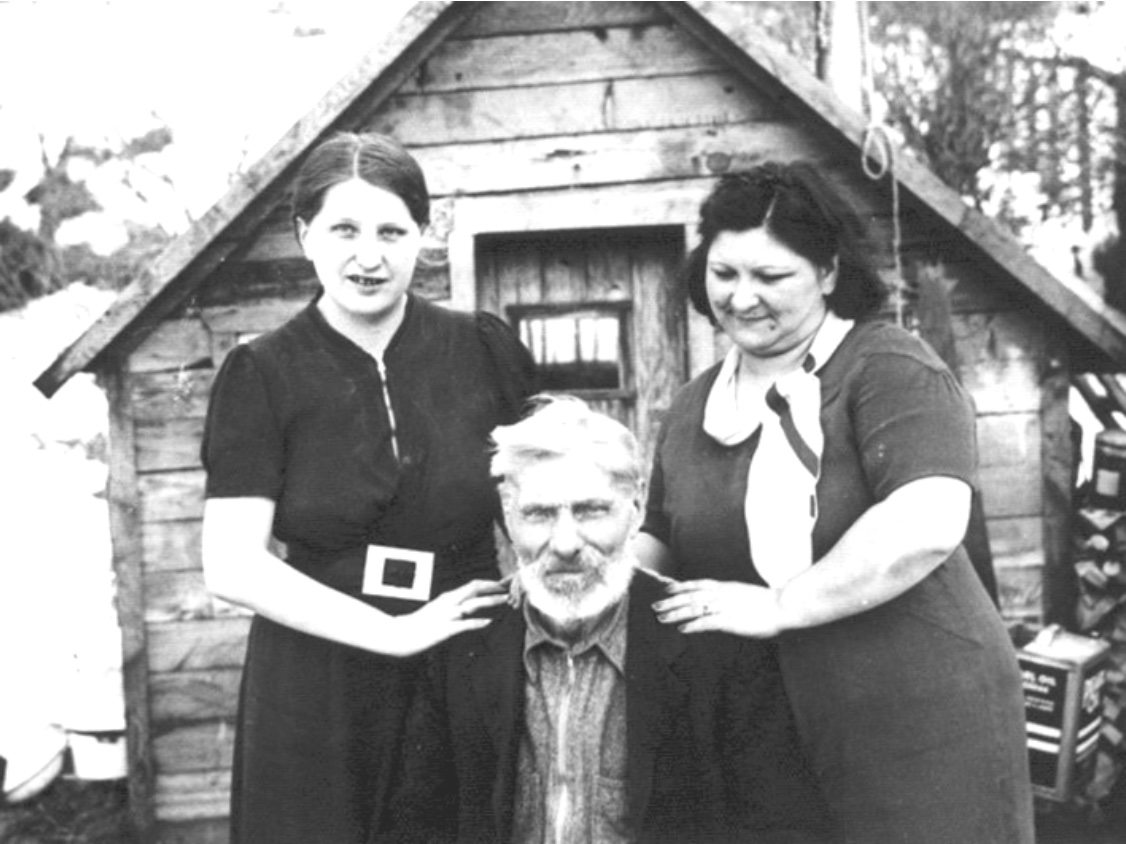
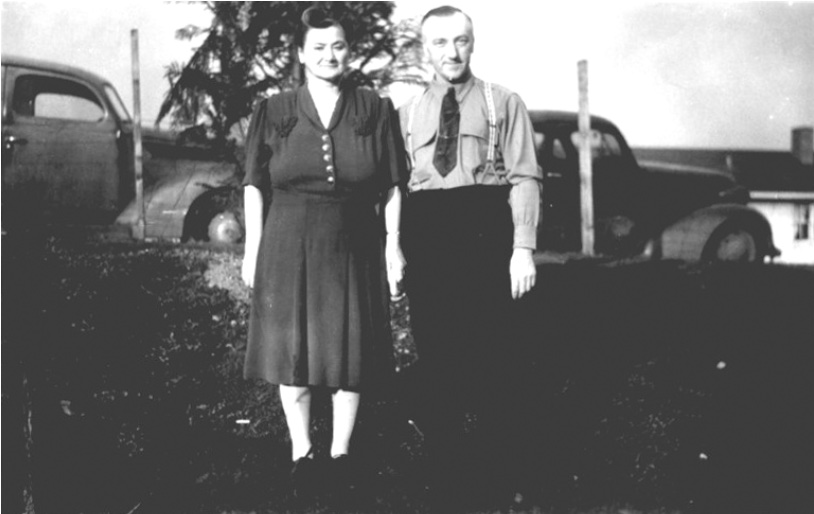
Up from Irene’s was Andy Anderson’s family. He was the marshal, and his children were Tony and Agnes.
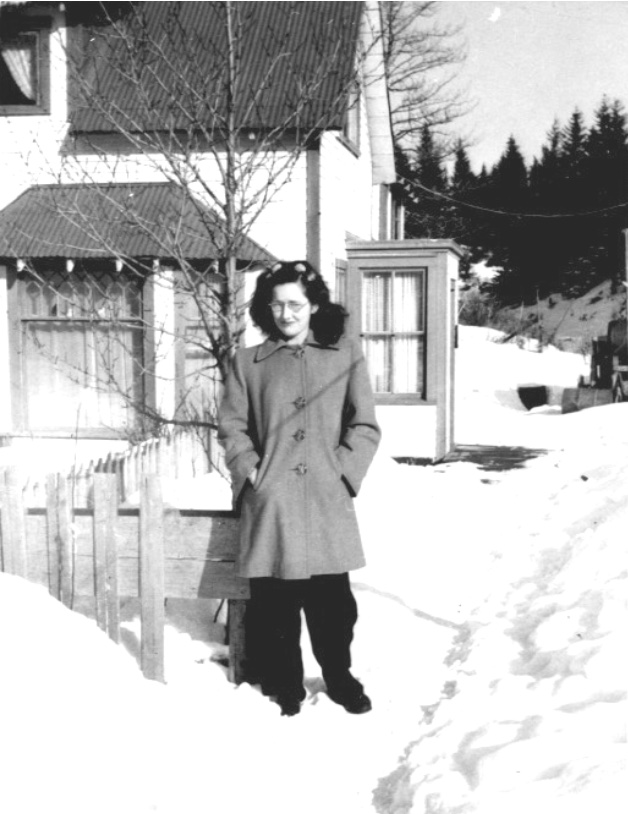
My great aunt Barbara lived across from the Andersons. She had no children, but took care of Grace Hennington’s boy Billy Joe until he went to his grandparents back East. Barbara also took care of Sally Hildonen when she was young. Sally was her brother Rufas’s granddaughter and my cousin. Barbara was very strict with Sally, but was also very funny; we could get her to laugh until she cried. She scared easily and while out walking we would say, “Auntie, there’s a bear.” She would run and when we told her there wasn’t a bear, she would laugh. We didn’t know that she had diabetes, only that she consumed quarts of soda pop. We liked that because she let us have it too.
Barbara’s first husband was Husby and her second was Arne Wick. Arne had a boat named the St. George that sunk one night with my brother Tom on it. All my brother Tom saved was one shoe, because the boat sank so fast.
My aunt Barbara had chickens; not many people in Seldovia did at that time. One day my brother Tom found a huge wild goose egg and put it in her hen house. She found it the next morning and every one in Seldovia heard about the big egg that her hen laid. None of us ever told her it was a goose egg.
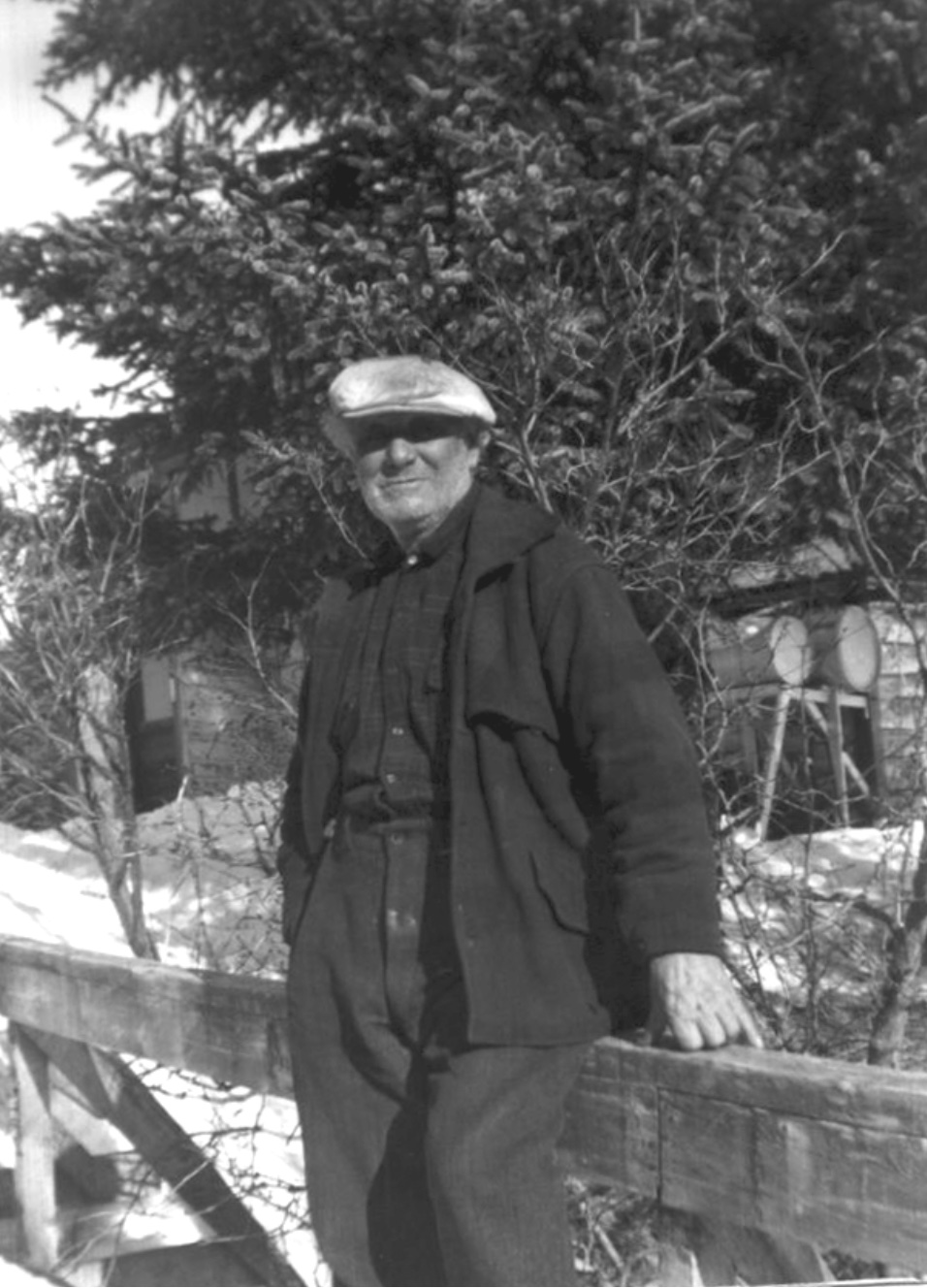
Uncle Rufas Bowen. When I was about eight or nine years old, I went in a skiff with someone. We went out to this huge sailing ship that was anchored in Seldovia Bay. We went to pick up my great uncle Rufas Bowen. He was caretaker on the ship. He went all around the world in sailing ships. He did trading with China, Japan, and other countries. He was master of the gas tender Buddy at one time.
Rufas Bowen was born in Kodiak 22 October 1879. He was the oldest son of Henry Richard Bowen. He came to Seldovia in 1912 and built his home where Mr. Morris’s house is today. He owned the property all the way to the waterfront. He had horses. His first wife died when young and he then married Sally and raised a big family in Seldovia. When I was young he had a tiny cabin on the beach near the cemetery. He traveled all over the world working for the trading companies in Alaska. He knew several languages, including Russian. He was a gentle man and we all loved him.
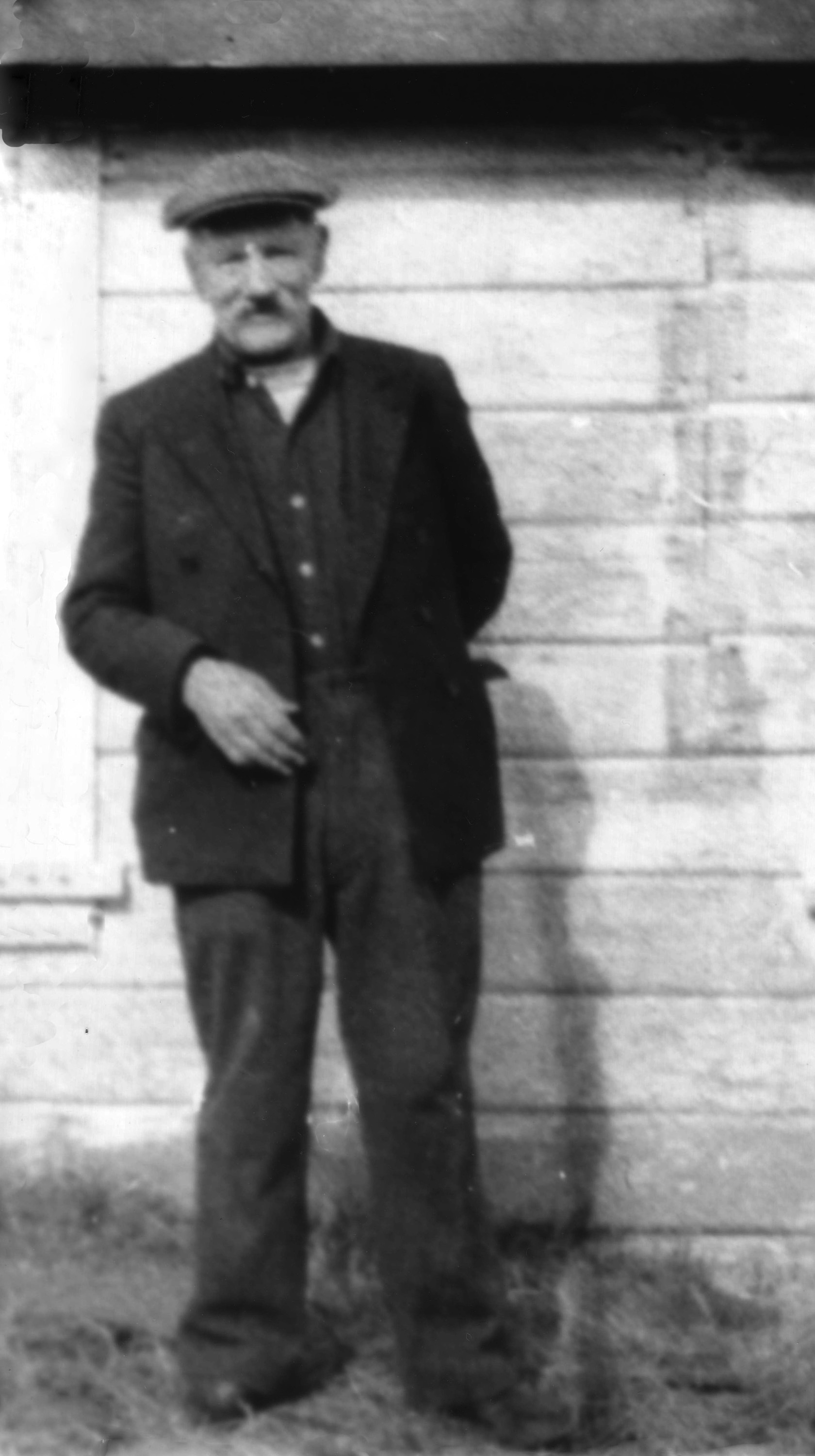
Grandfather Tom Fox. My grandfather Thomas (Tom) Fox was born 7 March 1877 in England. His records show New Castle Under Lyme. He died in Unga, Alaska, 20 September 1948. His father was William John, and his mother, Katherine Kenny, we think, came from Ireland.
I was told that he came to America when he was fourteen but was sent back as he was too young. He came again from Sidney, Australia, on the sailing vessel “Servia.” (We have a picture of the boat.) He arrived in San Francisco, California, 10 October 1910, and filed for naturalization in District Court of Unga, Alaska, on 18 August 1913. He was only 5’5” tall and had a tattoo ring on his left small finger.
Aunt Katy said that he was fishing the Bering Sea for cod and was shipwrecked off Unga Island. He married Emma Gardner. At that time if you married a native, you had hunting and fishing rights in Alaska and a lot of the men from other countries did that.
My father’s father, Thomas Fox Dolly, Deloris, Mae, Thomas (above), Arthur, Andrew. Thomas and Emma had ten children—Katherine Kashavarof, May, Edna, George (died in 1944 in the war), Hazel, Thomas (my dad), Mabel, Mary, and Sidney. They lived in Unga, Juneau, and Dutch Harbor, Alaska, and in White Salmon and Trout Lake, Washington. Three of their children were born in Washington.
After the war they moved back to Unga where Tom did his trapping, fishing, and hunting. He worked in a saloon where he tended bar. He played a guitar and sang Gaelic songs. It was said that he knew everything that went on in town and some of the men would come to him to get the new gossip.
A story is told of a man named Hubley who came into the saloon to find out the latest gossip. Tom said, “Hubley, I had a dream about you last night. We were going up to Heaven and the Lord told us to write down all our sins. As I was writing mine, I felt like I was treading on some fingers. I looked down and it was you, Hubley; you ran out of chalk.” Hubley didn’t come into the saloon for a while.

Grandmother Emma Gardner. Emma Gardner was born 17 August 1888 in Unga, Alaska. She was nicknamed “Nellie” by Tom. Her mother was Hannah Lazaroff, born in Belkofski, Alaska, and her father was John Saulivan Gardner who came from Scotland to Alaska in the 1800’s. When she was barely a teen, Tom asked her parents if he could marry her and they agreed. She had her first child when she was fourteen.
When Emma decided to move out of Unga, Tom refused to move, so they divorced. Emma had another son, Marvin Torgramson.
Grandfather Henry Richard Bowen. Henry Richard Bowen, my great grandfather on my mother’s side, came to Alaska as a sea captain in the 1800’s. He brought a load of salt and barrels for the canneries in Kodiak from Massachusetts. It was said that he was paid in shares in the Alaska Commercial Company. He was captain of the Pauline Collins when it went on the North Beach at Karluk 6 October 1881 because of a sudden change of wind. He then was captain of the ship the Seventy Six, a 38-ton schooner. He was in charge of all the company stores throughout Alaska. He went on the Seventy Six as an adviser and it was caught in a storm. The ship disappeared with all hands on board. They were last heard of in December of 1895. He left a large family in Woody Island, Alaska. He and his wife Barbara had ten children.


Grandmother Barbara Naumoff Bowen. Barbara Naumoff Bowen was born 17 December 1854 in Sitka. She was first married to William Smith and had two children, Julian and Anna. Her second marriage was to Henry R. Bowen. She moved to Seldovia in 1912 with her family when Mt. Katmai blew up. She married Bill Rhodes and lived in Seldovia until she died 13 December 1918. She was Russian Orthodox. Her father, Kandakoff, was Russian.
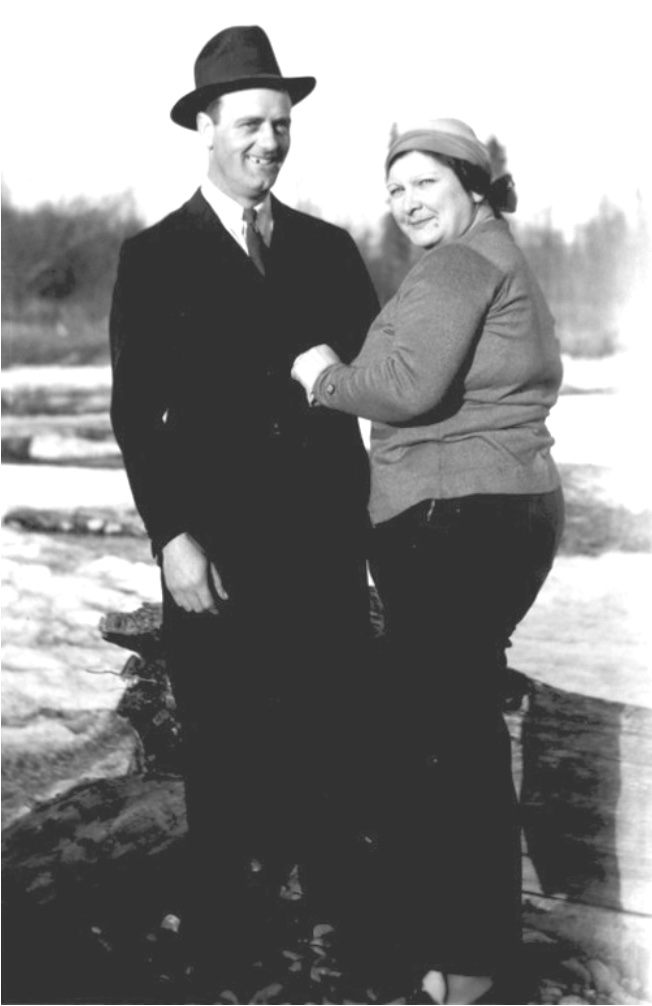
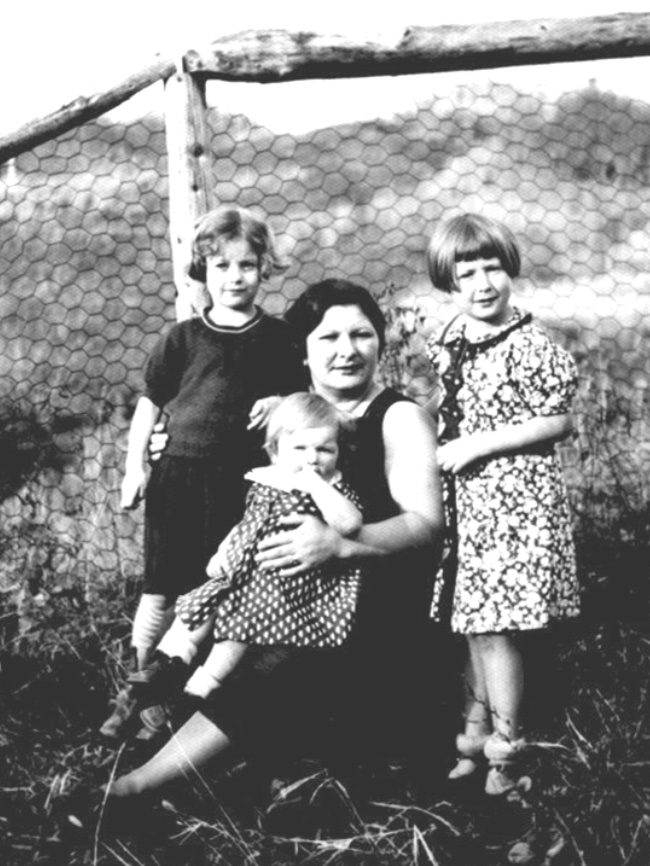
Aunt Susan B. My aunt Sue was the oldest of the three living girls. My mother was the second oldest. She was married to Leo Haskin from Oregon. He was my favorite uncle. Sue had no children of her own, but raised Frankie Radcliff, Elsie’s son, after Elsie died. She was a very domineering and cold woman, with her husband and with us. I stayed with her for a year while going with Fred Sharp, and it was pretty hard.
Aunt Elsie. My mother’s younger sister was born in 1918. She lived at home with her dad after her mother died in 1931, and then went to Seattle, I think to live with her aunt Florence Olssen. She married three times and her third husband shot her in February of 1947; he then shot himself. She had one son, Frank Radcliff, who was raised by my aunt Sue. She was fun to be with, but I didn’t get to see her but a few times.
My Aunt Katherine. Katherine Fox Kashavarof, my father’s sister, was the oldest of the Fox children. She was born 5 May 1906 in Unga, Alaska. The first time that I saw aunt Katy, she came to visit us in Seldovia. I was about nine or ten years old. I heard her tell my mother that she would like to take me home with her. I avoided her after that because I was afraid that she would kidnap me. My mother had six children and people didn’t think that she could raise us all alone in Alaska. I was suspicious of anyone saying they wanted me, so I wasn’t about to go with her. When I was much older, I met her again and found out that she was a beautiful aunt.

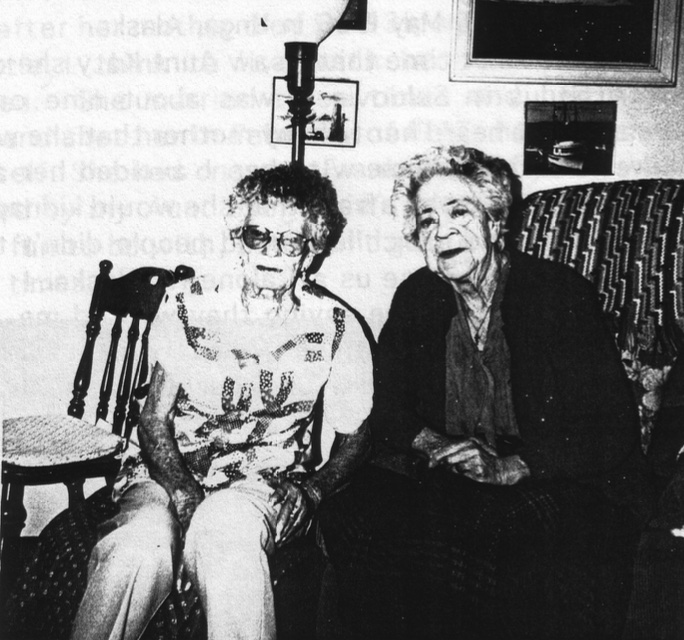
My Aunts. Edna, one of my dad’s sisters, was born 12 August 1908 in White Salmon, Washington. I didn’t know her very well and only saw some of her children a few times.
Aunt May was born 1 April 1912 in Trout Lake, Washington. I visited her and her husband Paul in Pismo Beach and then she came to Petaluma to visit us. She was the domineering one of the girls.
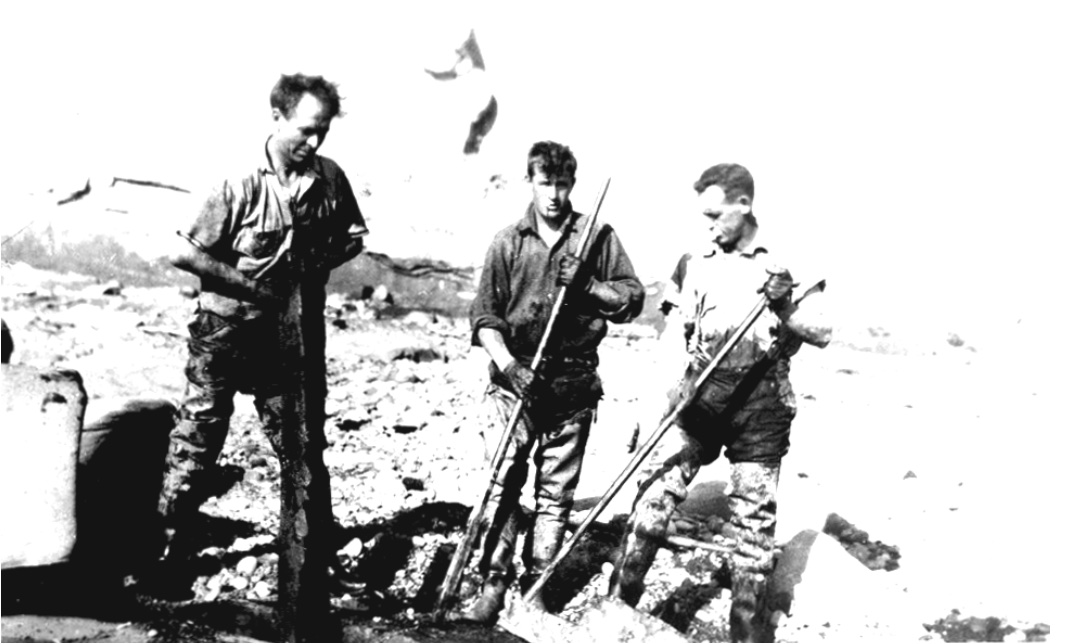

Thomas Kenny Fox. My dad was gone a lot. He went out on the boats for coal, which we all burned in Seldovia. He trapped for furs and fished and hunted. He was even a sheriff in Dutch Harbor. He was born in a small village of Unga, Alaska. His mother was native Alaskan and his father was from England.
When he would come in from trapping, I can remember he had big boxes of blue fox and silver fox furs. He had a problem when he drank, like a lot of native people. He would always want his guns and my mother would hide them when she knew he was drinking, and that made him all the more furious and this always led to fights. He got tuberculosis when I was quite young and was sent to a Seattle hospital. I only saw him once after that. Before he came home, my mother divorced him.

Mother. My mother, Harriett Catherine Johnson Fox, was blind for ten years, but she still went to school. Mother’s first school was the Russian school in Seldovia. Then she went to the American school, which was in the building that was later the library. She said that the kids in school picked on her. She had long hair and they always pulled it and dipped her braids in the ink wells on her desk. When she was about ten years old she was out camping with her family. She said that she bumped into a spice rack by the tent door and pepper fell in her eyes. She came out of her blindness right then, and the first thing that she saw was a big boat. It may have been the bump that brought her out of her blindness, but she thought it was the pepper.
When all the family had the flu in the 1900’s, Mom had to cook for the family. All they could eat was rice. She said the first time that she cooked rice, she filled the pot full and added water, and the rice pot filled up; she added another pot and more water. When she had several pots on, she finally called a neighbor to help her.
She married young and had six children. She raised her family all by herself, without welfare. All the jobs that she had were in the restaurants. She worked for Russian John, and for the Lynwood Cafe. She was a wonderful cook in the restaurants and at home. She baked all our bread and also did most of the baking for the restaurants.
My mother did everything for the teens, having dances at the house when the grown-ups wouldn’t let us in the dance hall. She always managed to have food for us for our dances and picnics. We always coaxed her into doing things, like learning to ride a bike on the boardwalk and she fell off the walk onto the beach. I talked her into riding on the bar of my bike with me down our hill. She froze and hung on to the handle bar and I couldn’t turn the bike, so crashed into the bank, which was full of stinging nettles. Another time we talked her into sliding down our hill. It was quite steep from the porch to the main road and icy. She took off fast and we were all yelling turn, turn, but instead she went straight off the bank into the road. The kids always wanted her to go on our picnics, I think because she brought all the food. She always got thrown into the water, but only laughed.
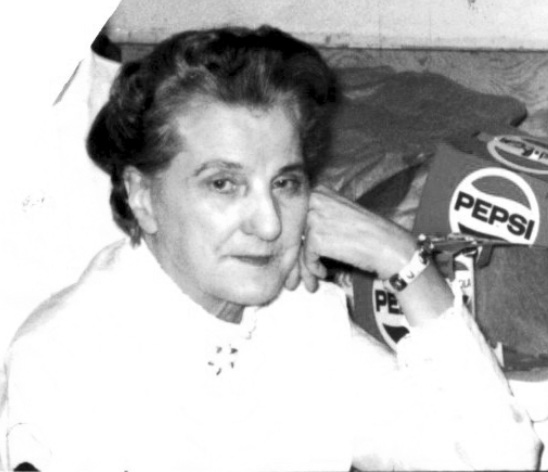
Mom always helped anyone that needed help. Even though she worked long hours to feed her six kids, she always had food and a bed for anyone that needed it. My brothers brought home Louie Nagy whom they found sleeping on the Outside Beach one day. He stayed for eight years and helped us, too. Louie was a beautiful artist and married Helen Crawford.
When my friends had problems, they came to her. On birthdays they always remembered her, usually with a tea cup and saucer.
My mother had so many operations. She had cataracts removed; she had seven goiters, which almost killed her because she waited so long to be operated on, because she was afraid to leave the children alone. She had a nose operation and many female operations. She started smoking when she was thirty, but was never a heavy smoker and quit before she died. She died of angina, blockage of the arteries, quietly in her sleep.

Thomas. My brother Thomas’ nickname was Bunson. When he was about nine or ten years old, he was caught smoking cigarettes. I can remember Mom sat him in a chair in front of the wood stove. She made him smoke cigarette after cigarette. He was so sick and I was so upset and cried and cried while I watched him smoke them. I don’t know if it cured him as he still smokes.
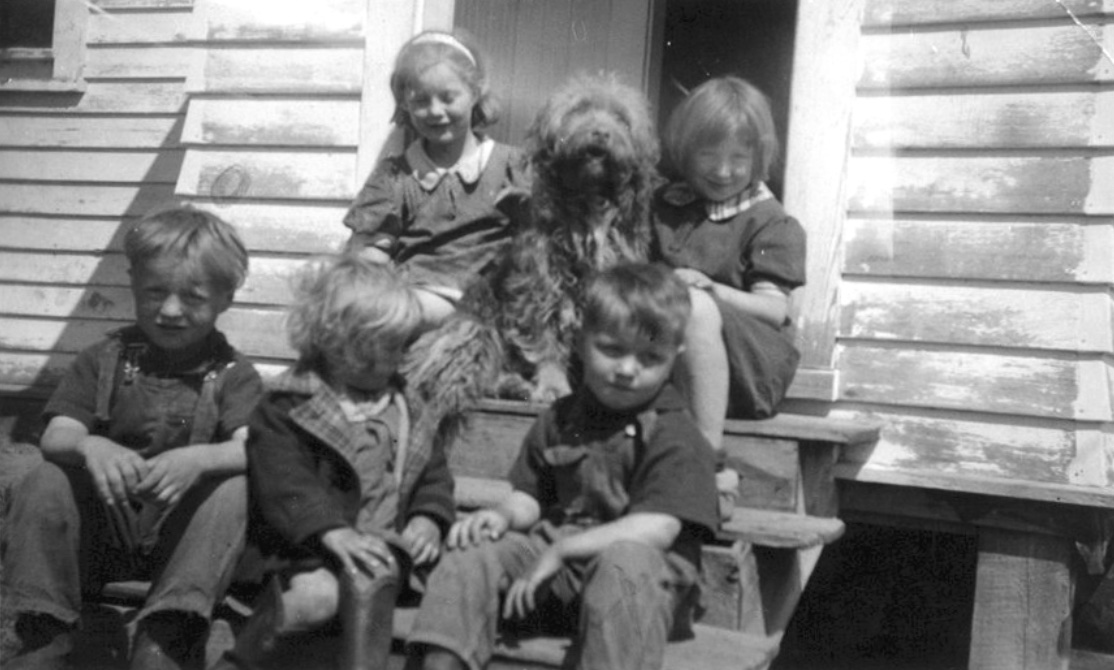
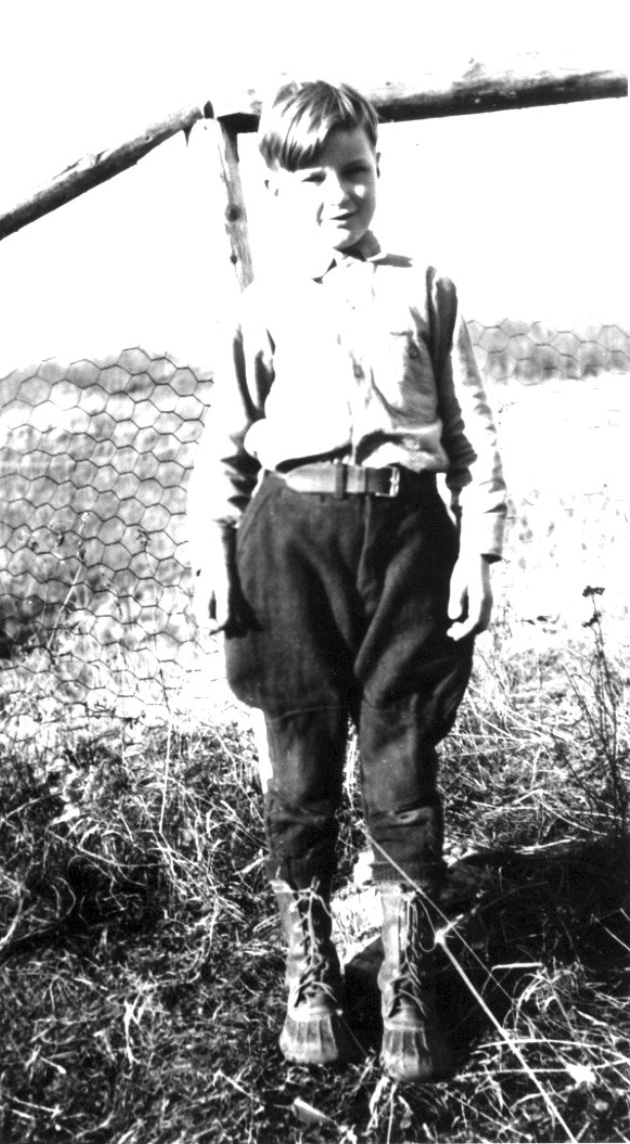
Brownie was a smart shaggy dog. Once when I was about three years old, I remember climbing the gate to get out of the yard. He grabbed the back of my coat and dragged me back to the house. He used to lick the snow off my shoes before I went in.
Once my dad shaved Brownie because it was so hot. He only shaved him half way. Brownie acted like he was ashamed of it and hid behind the house all day.
When my brother Thomas was young, he was on a boat with Dad. Our dad decided to go to town to visit someone. Thomas was to stay on the boat and watch. I guess it got quite late and he wanted to go to shore. The boat was tied to a barge and the barge had a big rope tied from it to the shore. Thomas figured that he could hand over hand and get to shore but never thought to take his big boots off. He went upside down in the water. Brownie was on shore and saw him in the water. He ran up to the house where Dad was and barked until Dad came to the shore and saw him in the water. When he was brought out, he had water in his lungs. He was sent to Seattle and was in the hospital for a long time.
I was always finding money as a child. Thomas had to take me to school each day, and he and his friends would go over Cap’s hill, through the bushes and under the canneries and boardwalk and I’d get to school feet wet and twigs in my hair. I knew he hated to take his sister to school and I didn’t say a word, just followed him. One day I found a large bill, I think it was $10, on the beach. I gave him the money to carry, and from that day on he didn’t seem to mind me following behind.
Thomas was letting his hair get long, and in those years just a little long was enough to get in trouble in school. The teacher told him that he couldn’t come to school until he cut his hair and that really upset me, because he said that he wasn’t going to cut it. The next morning before he was awake I crept into his room and cut his hair on one side. He was pretty mad at me when he woke up, but he got a hair cut and didn’t get kicked out of school.
When I was in my teens, I saw a red print silk dress in Lipkey’s store that I wanted so badly for a dance. My brother Thomas sold a gun to buy it for me. This really surprised me. It was so nice of him, because I knew how important guns were to the boys; they did a lot of hunting for us all to survive.
Thomas, like me and Deloris, had to grow up fast. He was the oldest. He fished before he was in his teens and supported Mother and her children.
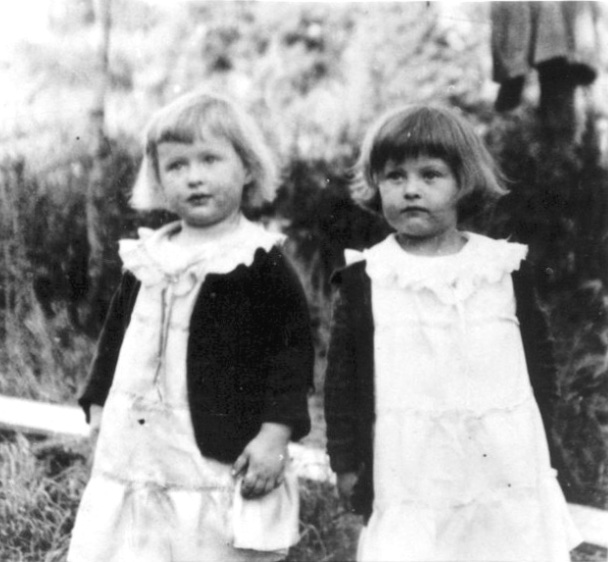
Deloris. My sister was one year and ten days younger than I. She was born with a neck cord shorter on one side than the other. When she was about eight, she was sent to the orthopedic hospital in Seattle and was in a neck cast after an operation for many months. We got along pretty well, but like most kids, fought now and then. I tripped her once when we were little; I think it was for attention, but she got a big bump on her head and I got punished, so I didn’t get much attention. She said that she has a picture of herself with two different shoes on.
Deloris and the Goose Egg. On Mary Jensen’s porch was a big egg, which was probably a goose egg. My sister Deloris said that she saw this big egg and had to have it. One day she went to Mary’s house when she was gone and she stole the goose egg. She said that she kept it until it disintegrated.

Andrew Alfred. When my brother Andrew was young, we called him Sonny. Then later we called him Swede. People always asked me if we were twins. He always teased me. When I’d come home from a date, he would peek through the key hole, and as soon as I’d open the door, he’d be sitting on the couch strumming his guitar and would sing me love songs. I don’t know if he could really play, but I finally took the guitar and smashed it over his head.
He and I were both stubborn, but I was in charge when Mom worked and they were supposed to mind me. One day I needed him to go to the store for me and he wouldn’t go, so I sent him upstairs until he made up his mind to go for me. I held the door at the bottom of the stairs while he yelled and kicked. I yelled back that he wasn’t coming out until he decided to go the store for me. He didn’t go and I didn’t give up at the door all day.
He didn’t just tease me; he teased everyone. I always said I pitied the girl that he married.

Coogan. Arthur William is his full name, but he is still called by his nickname. His early years were spent on our hillside pounding nails in the trees. When he was about twelve years old, he rented a skiff from the cannery, I think for two hundred dollars. He’d go up the bay and fish. Once when a neighbor, Charlie Nelson, flew over, he saw Coogan robbing the creek for salmon. When the plane flew low, Coogan thought it was the game warden, so jumped out of the skiff and hid in the bushes. Charlie got such a kick out of that, he told everyone. Mom and I went fishing with him once. He said that women were bad luck to take fishing, but did so anyway. He caught only one fish, which was our fault, but we went on the beach and he cooked it for us.
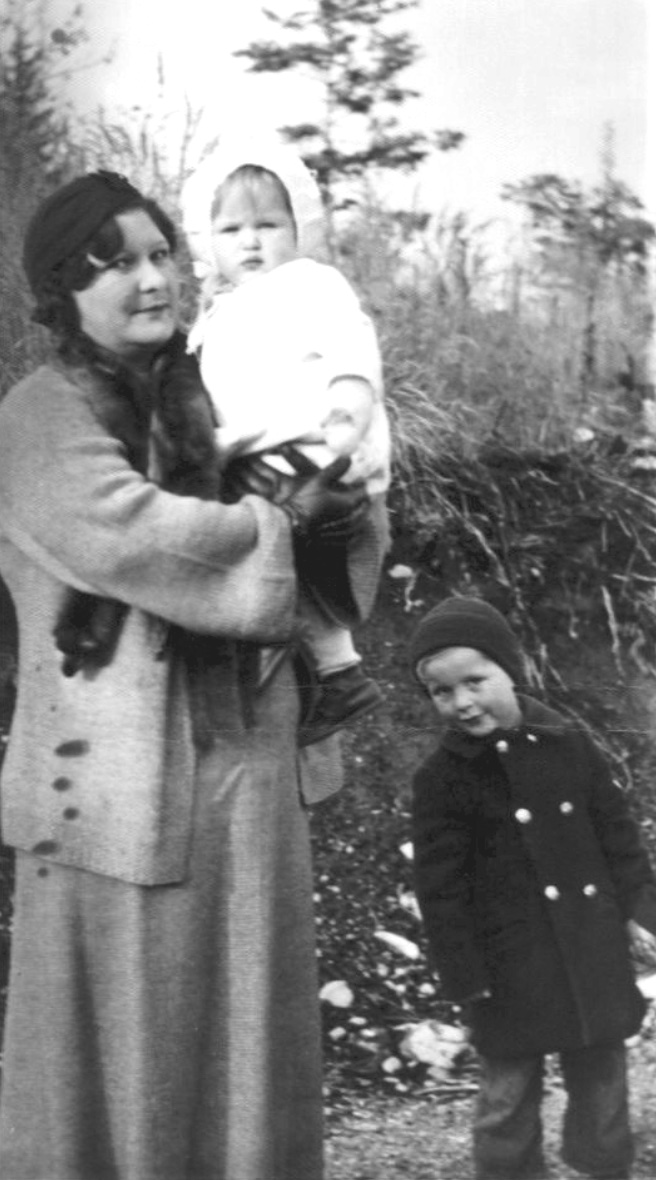
Dolly. My sister Dolly’s name is Lettie Lavern, but we also had a baby name for her, Cookala, which I think was Russian Aleut. She was about six years younger than I, so she was always the baby. She was born with real bad eyes, and couldn’t see every well. When she was older, her eyes were washed with a native concoction and it seemed to make them much better. She was crazy about animals, and brought home stray dogs, cats, chickens, and anything else that crawled.